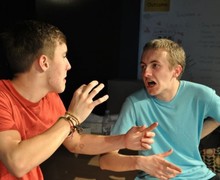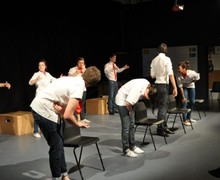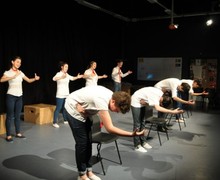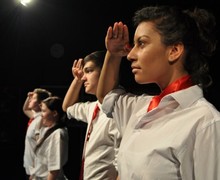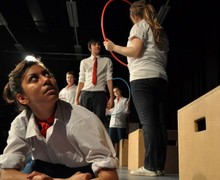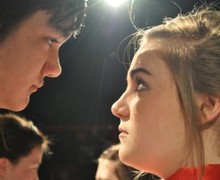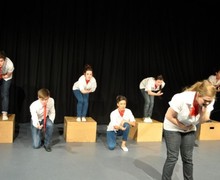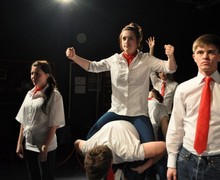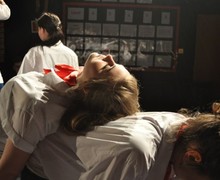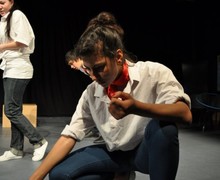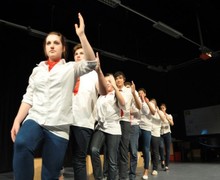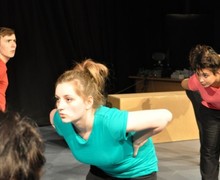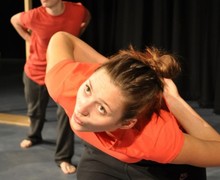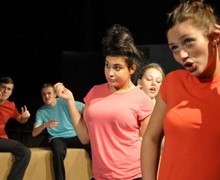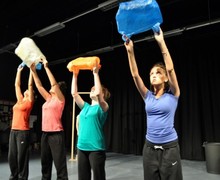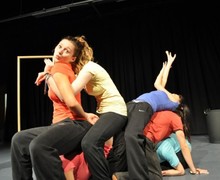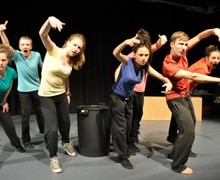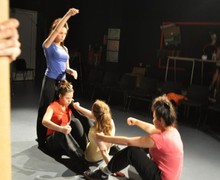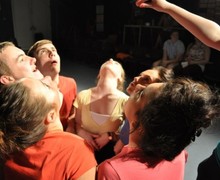Drama
Drama Curriculum Intent
Drama is a new skill for many in KS3 and therefore the curriculum is very much designed so that each term skills are built on and combined with others. The baseline skills that pupils are expected to learn is that of storytelling through a variety of techniques. They must acquire basic communication skills, such as vocal clarity and projection to tell these stories to an audience. Once pupils have an understanding of how to communicate as themselves, the focus shifts to developing characterisation skills. Pupils will begin this skill through devising, meaning that the focus is on them creating and becoming different characters rather than them needing to work from a script. The rationale behind this is that until pupils have basic characterisation skills they are not able to decipher and embody a character from a written text.
In KS3 to KS4 the use of play texts and scripts are introduced more commonly. Pupils in KS3 do use narration early on whilst learning the base line skill of storytelling, therefore once we bring in play texts to Year 9 the pupils literacy has been built upon gradually. The focus now is on bringing a character to live from an existing text and narrative. This skill is then further developed through KS4 by ensuring that pupils are also using memory and performance skills together. Pupils must perform off script, tying together their initial storytelling skills with their developing communication and characterisation skills. Once in KS5 all skills are being developed in conjunction with each other, both Devising and Play Texts. The pupils are expected to be able to embed practitioners' techniques and styles into their own performances, developing a sense of sophistication and depth to their pieces.
Another skill that is scaffolded from the outset is the skill of analysis and evaluation. Pupils in KS3 verbally evaluated their peers' performances, with the focus on encouraging confidence to feedback. Once this has been established pupils then move on to learning to analyse a performance, with the focus on the use of appropriate language in their written work in KS4. Pupils must develop a sense of self-awareness in order to analyse and evaluate their own successes and areas of development. By KS5 this skill is deeply embedded and pupils now push it further by ensuring analysis and evaluation is written about with sophistication and Drama terminology. Making perceptive links between the skills used and the success of impacting an audience.
Drama is the most universal tool of storytelling and communicating.
In every culture and society dramatic expression has been prevalent. Drama at Blenheim enables you to gain a clear understanding of a range of drama and theatre experiences. You will focus on what it is like to look at different issues, points of view and perspectives. Students will focus on a range of drama skills, styles and techniques to create their own imaginative and creative theatre.
Exploring drama through characters, issues and situation, focusing on scripted and improvised work and discovering a variety of dramatic genres, Drama at Blenheim ensures that students have a well-rounded and exciting curriculum. Performance and evaluation are at the root of Drama at Blenheim. Studying drama gives you an increased confidence in communication skills.
KS3 Drama
Year 7
Term One
- Introduction to Drama & Storytelling
- Animal Rights
Term Two
- Characterisation
- The Lion, The Witch & The Wardrobe
Term Three
- Macbeth
- Macbeth Cont.
By the end of year 7 you will have covered basic drama skills and techniques and will be aware of how the drama process works. You should be able to identify and talk about some of the techniques and skills, identify and understand the issues that go with the drama and be aware of the contribution that personal and social skills make to the drama process.
Year 8
Term one
- Status
- Sweeney Todd
Term Two
- Battle Cries
- Frankenstein
Term Three
- A Midsummer Night's Dream
- Watch over Me
Year 8 will reinforce the basic drama skills and techniques. You should be able to develop them as well as adding new ones. Your skills of organisation, listening, maturity and sensitivity towards the drama should have improved.
Year 9
Students will be following similar units to the ones examined in year 10 and 11 and an introduction into GCSE Drama.
Term One
- Text in Practice – Component 3 GCSE Spec.
- Writing a Theatre Review – Component 1c GCSE Spec.
Term Two
- Devising and Performance – Component 2 GCSE spec.
Term Three
- Devising and Performance – Component 2 GCSE spec.
- Studying a Set Text – Component 1 Section B GCSE spec.
-
â¯
Year 9 will reinforce further drama skills and techniques, and be introduced to more advanced skills and techniques. You should be able to select appropriate drama form including abstract and naturalism, as well as give constructive feedback to the work of others. You should be able to contribute effectively, working well with all types and sizes of groups.
Those students working towards the top end will be taking on the role of the director in groups as well as a lead role in performance. By the end of the year a full mock will have been completed for all GCSE components.
What Skills Students Develop
- Devising
- Performing
- Evaluating
- Directing
- Improvising
- Listening
- Watching
- Challenging
- Expressing ideas and feelings
- Discussing ideas
- Making decisions
- Acting
- Role play
- Exploring with voice
- Exploring with body language
- Characterisation
- Mime
- Symbolism
- Manipulation of pace
How Students Are Assessed
Our assessment policy is based upon the 2003 Arts Council descriptors for Drama in Schools. Follow link for more information: http://www.artscouncil.org.uk The link at the end of the page will show the KS3 Levels.
Assessment is by
- Teacher assessment and feedback
- Peer evaluation
- Self-assessment
Assessments in drama are carried out once every half term and students are given structured and focused feedback on each assessment they complete.
Homework
Homework tasks will be set every fortnight. This can take the form of:
- Research tasks
- To bring in pictures/props/costumes
- Rehearsal in the students own time
How Parents Can Help
The best way to help Drama students is to take them to visit the theatre regularly. Students should also be encouraged to join a youth theatre group. Talk to your children about their drama lessons and the work they have been exploring.
Useful Links
www.shakespeare.com
www.shakespeares-globe.org
www.nationaltheatre.org.uk
www.rcs.org.uk
www.dramalinks.com
https://www.bbc.co.uk/bitesize/subjects/zbckjxs
http://www.rosetheatrekingston.org
http://www.epsomplayhouse.co.uk
http://www.dramagroups.com/groups/england/surreyx.htm
KS4 Drama GSCE
Board and Exam Details
Student follow the AQA Drama GCSE.
Course detail
In the first year of the course, students explore and develop the skills with which to devise their own original pieces of drama. The students use a range of current issues as a stimulus to gain ideas for performance. During Year 10 the students focus on Component 1 – the written exam, ensuring all knowledge needed for this component is being embedded from the outset of the year. They will also undertake component 2 – the devising performance which is worth 40% of their overall GCSE grade.
In the second year students undertake the second of the performance units worth a further 20%.
- Devising
- Performing
- Evaluating
- Directing
- Improvising
- Listening
- Watching
- Challenging
- Expressing ideas and feelings
- Discussing ideas
- Making decisions
- Acting
- Role play
- Exploring with voice
- Exploring with body language
- Characterisation
- Mime
- Symbolism
- Manipulation of pace
What skills students develop
- Develop a personal interest in why drama matters and be inspired, moved and changed by studying a broad, coherent, satisfying and worthwhile course of study.
- Work imaginatively and creatively in collaborative contexts, generating, developing and communicating ideas.
- Consider and explore the impact of social, historical and cultural influences on drama texts and activities.
- Reflect on and evaluate their own work and the work of others
- Develop and demonstrate competence in a range of practical, creative and performance skills.
- Develop a basis for their future role as active citizens in employment and society in general, as well as for the possible further study of drama.
- Actively engage in the process of dramatic study in order to develop as effective and independent learners and as critical and reflective thinkers with enquiring minds.
How students are assessed
|
Exam (1.75 hrs) |
Understanding Drama |
40% of the qualification |
|
Practical Exam |
Devise a performance based on a selected stimulus |
40% of the qualification |
|
Scripted Practical Exam |
Texts in Practice - performance of two extracts from one play |
20% of the qualification |
An outline of the assessment process can be found below;
| Component 1: Understanding drama |
|---|
|
What's assessed
|
|
How it's assessed
|
|
Questions
|
| Component 2: Devising drama (practical) |
|---|
|
What's assessed
|
|
How it's assessed
|
| This component is marked by teachers and moderated by AQA. |
| Component 3: Texts in practice (practical) |
|---|
|
What's assessed
Free choice of play but it must contrast with the set play chosen for Component 1 |
|
How it's assessed
|
| This component is marked by AQA |
Homework
Homework tasks will be set every fortnight. This can take the form of:
- Written tasks
- To bring in pictures/props/costumes
- Rehearsal after school and at weekends
- Going on regular theatre visits
How Parents Can Help
Parents can help by taking students to the theatre as much as possible. You can ask your children about their drama and the work they are exploring. Students will often have lines to learn, they will learn these best by speaking them out loud to someone at home. If your child has a real passion and talent for drama then encourage them to join a youth theatre group.
Useful websites:
https://www.bbc.co.uk/bitesize/topics/zxv7sg8
https://www.nationaltheatre.org.uk

